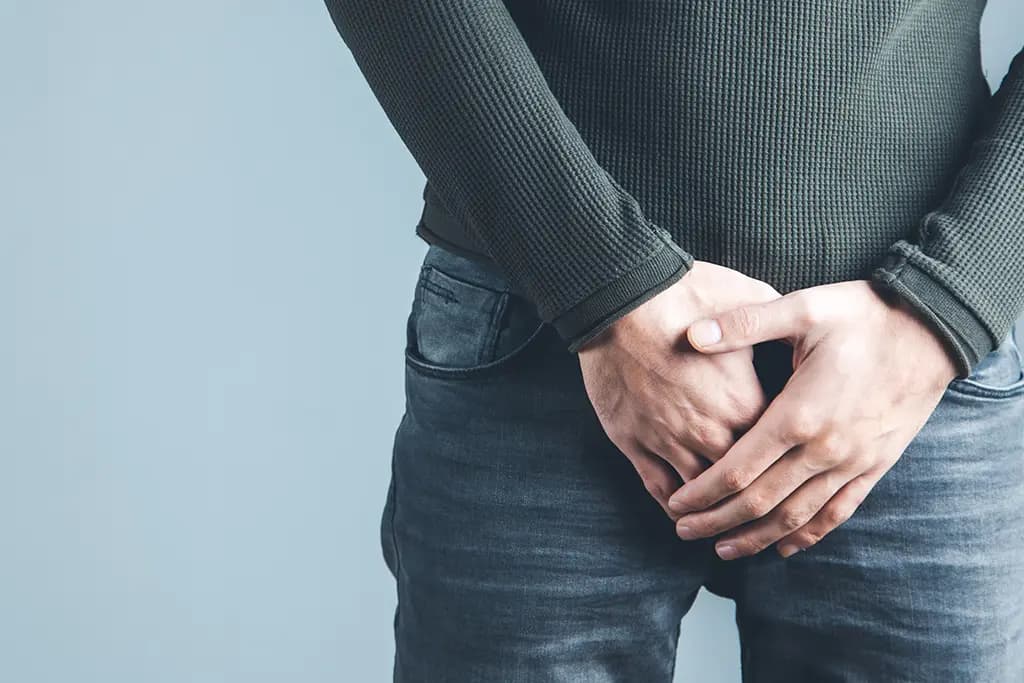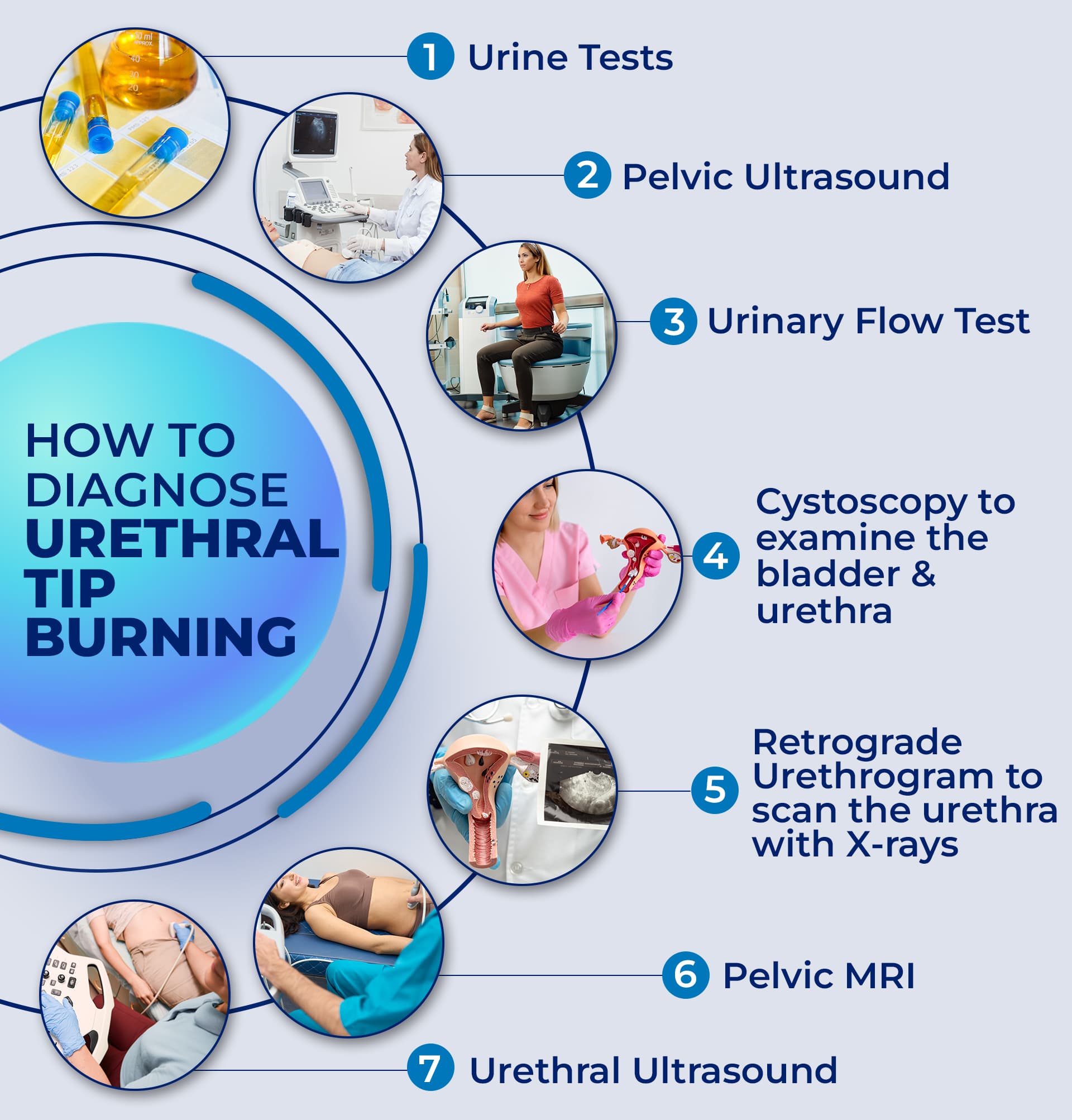
6 Major Causes of Non-STI Burning at the Urethra Tip
Discover the 6 reasons for non-STI urethral burning. Know the causes beyond STDs and seek suitable solutions. Get expert help.
If you are a male or a female, the feeling of burning at the tip of urethra may be a sign of urinary tract infection or sexually transmitted illness such as gonorrhoea or chlamydia. But there can be other causes too.
For males, the urethra is the tube which runs from the bladder through the penis. In females, it runs from the bladder through pelvis. The urethra carries urine from bladder out of your body. But there are cases when something other than an STI will lead to burning sensation at the tip of urethra.
Causes
There are cases when burning at the tip when you pee occurs. Here is a closer look at some possible causes:
UTI (urinary tract infection)
When you have a UTI, the bacteria make their way to the bladder where they multiply and spread through urinary system of the body. Some people might develop a UTI after anal, oral or vaginal intercourse which can expose urethra to bacteria.
Generally, females are more likely to suffer from a UTI than men as their urethras are shorter than that of men. Any bacteria which enters the urethra needs to travel a short distance before reaching the bladder, where it will spread through the urinary tract.
Urethritis
Urethritis or inflammation of the urethra may occur from an STI. But other causes of irritation of the tip of urethra may be the reason for urethritis. Common irritants are the following:
deodorants
lotions
soaps
spermicides
Improper hygiene may cause urethritis. It can happen due to physical damage to the urethra such as masturbation, vigorous sex or medical procedures such as catherer insertion.
Kidney stones
These are hard masses of minerals and salts which form inside the kidneys and move through your urinary tract. Kidney stones usually happen due to improper diet, infection or dehydration. Genetics also has a crucial role in whether or not a person develops kidney stones.
Sometimes these stones make it to the tip of urethra at the time of urination. They can be extremely painful to pass, especially if they are larger in size.
Urethral stricture
Urethral stricture or scarring narrows the urethra and may lead to infection or inflammation causing burning sensation at the tip. Some causes of the buildup of scar tissue in the urethra are the following:
trauma to the urethra or pelvis
enlarged prostate gland
prostate and radiation therapy
medical procedures
surgery to remove enlarged prostate gland
cancer in the urethra
catheter use for long term
Prostatitis
For men, prostatitis or swelling of prostate gland may be the reason for burning at the tip of urethra
Prostate cancer treatment
According to research, some types of treatment for prostate cancer may lead to burning sensation in the urethra. Prostate cancer survivors may suffer from pain in the urethra even after their last treatment.
Other symptoms
Here are some other symptoms you might expect when there is a burning sensation at the tip of urethra that is not an STI:
UTI
Some other symptoms of a UTI include:
frequent need to urinate
strong-smelling urine
cloudy urine
pain in the pelvis for females
passing small amounts of urine
brown or reddish coloured urine
UTIs affecting specific parts of urinary system can lead to additional symptoms, such as:
pain in the upper side and back
nausea
high fever
pressure in your abdomen
chills
urethral discharge
vomiting
Urethritis
Females with urethritis sometimes do not have any symptoms. Men are more likely to show the signs within days after getting the infection or exposure to irritants.
Common symptom is pus that comes out of the urethra or penis or urethra appears to smell. Males with urethritis might experience swelling and pain in one or both of the testicles and irritation along the penis.
Kidney stones
Other symptoms of kidney stones consist of the following:
strong pain in your back and side
brown or reddish urine
foul-smelling urine
nausea
pain that moves into the groin and lower abdomen
cloudy urine
pain that comes in different intensity levels and waves
pain during urination
frequent urge to urinate
urinating in large or small amounts
fever and chills
vomiting
Urethral stricture
Urethral stricture is more common in males when compared to females. Other symptoms include the following:
inability to empty the bladder completely
straining during urination
increased need to urinate
spraying at the time of urination
urinary tract infection
weak urine stream
Prostatitis
Other symptoms of prostatitis are the following:
blood in the urine (reddish or brown urine)
difficulty urinating
cloudy urine
flu-like symptoms
irritation or pain in the penis or testicles
pain at the time of ejaculation
pain in the abdomen, groin, or lower back
frequent urination during the night
pain in the area between scrotum and rectum
urgent need to urinate
Prostate cancer treatment
Some side effects of prostate cancer treatments are the following:
breast growth
osteoporosis
bowel problems
difficulty getting an erection
mood swings
dry orgasms
infertility
fatigue
hot flushes
loss of libido
heart problems
urine leakage and problems
Diagnosis
The doctor will ask some questions to find out about your medical history to determine the exact cause of burning at the tip of urethra. They may even ask about your sexual history and whether or not you have had kidney stones or cancer in your family.
Your doctor will conduct a physical examination to detect any signs of infection like fever. They will run some diagnostic tests to identify abnormal results.
These include the following:
cystoscopy to look at bladder and urethra with the help of a camera
pelvic ultrasound
urinary flow test
retrograde urethrogram to look at urethra
pelvic MRI
urethral ultrasound
urine tests
Based on the diagnosis, your doctor may refer you to a specialist like a gynaecologist or obstetrician to treat the exact cause of your symptoms.

How to diagnose urethral tip burning
Treatments
Treatments for burning sensation at the tip of urethra will differ based on the exact cause.
UTI
You may be give antibiotics or in extreme cases have to remain in the hospital for intravenous antibiotics and hospital care.
Urethritis
You may be give antibiotics. You may be given medications to relive discomfort and pain. Your doctor might even ask you to:
prevent masturbation or sexual intercourse for a few weeks
remove a catheter
practice protected and safe sex to avoid urethritis in future
stop using products known to cause irritation
maintian healthy hygiene practices
Kidney stones
Smaller kidney stones are easy to treat compared to larger stones. For small stones, the treatment usually includes:
alpha blocker medication
surgery to remove stones in the kidney or urethra
drinking lots of water
pain medication
For larger stones, the doctor may suggest:
surgery to remove kidney stones
using sound waves to break up stones
surgery to lessen activity of parathyroid gland, contributing to the formation of kidney stones
Urethral stricture
Several things are done to ease this condition which includes:
catheterization
dilation
endoscopic urethrotomy or scar tissue removal using a laser
urethroplasty or enlargement of the urethra
implanted stent or permanent catheter to keep urethra open
Prostatitis
Certain medications can be used which are the following:
anti-inflammatory drugs
alpha blockers to relax the bladder and lessen pain
antibiotics
Prostate cancer treatment
You can pause the treatment if your doctor says it is appropriate. Otherwise, you can try out anti-inflammatory medications.
Closing Note from MD.co.uk
Burning sensation at the tip of urethra is a concern whether it is caused by STI or not. For cases of burning at the tip of urethra with extreme pain at the abdomen, back, sides, fever, chills, or nausea, seek emergency help as these are some signs of severe infection.
If the symptoms last for more than a few days or are accompanied with other unusual symptoms, you need to contact Md.co.uk to book appointment at private GPs for immediate help.

We Are Here!
Mon-Fri from 9am to 5pm




